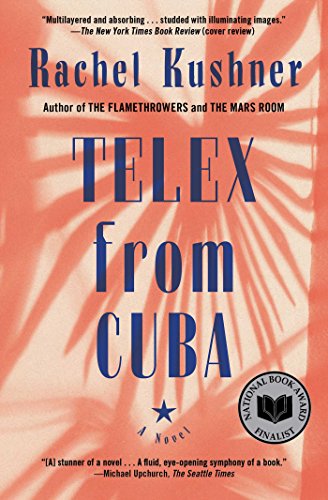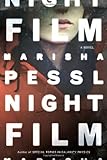 Like Rachel Kushner earlier this year, Marisha Pessl faced a nightmare known to only the luckiest novelists. Pessl’s debut, 2006’s Special Topics in Calamity Physics, was a smash critical and popular success that fetched a six-figure advance, and now she needed to produce a follow-up that somehow topped it. Like Kushner before her, Pessl resisted the temptation to stick with a winning formula; instead she used a broad canvas to produce a novel that is in every way bigger, more ambitious, and more satisfying than her splashy debut.
Like Rachel Kushner earlier this year, Marisha Pessl faced a nightmare known to only the luckiest novelists. Pessl’s debut, 2006’s Special Topics in Calamity Physics, was a smash critical and popular success that fetched a six-figure advance, and now she needed to produce a follow-up that somehow topped it. Like Kushner before her, Pessl resisted the temptation to stick with a winning formula; instead she used a broad canvas to produce a novel that is in every way bigger, more ambitious, and more satisfying than her splashy debut.
Pessl’s new novel is called Night Film. People who require categories for their fiction should probably shelve it in the “literary thriller” section, though a genre label is as pointless as a plot summary for a novel as ectoplasmic and slippery as this one. On its base level, Night Film is an exoneration quest by Scott McGrath, the book’s narrator, a disgraced investigative journalist who once tried to penetrate the shell of a reclusive filmmaker named Stanislav Cordova — only to get sued by Cordova and lose everything, including job, wife, daughter, and a fair chunk of his life’s savings and self-esteem. Cordova’s disturbing films, which give the novel its title, have developed a cult following that is literally underground: the movies are so shocking that they’re shown only at secret screenings in tunnels under cities. McGrath describes Cordova as “a crevice, a black hole, an unspecified danger, a relentless outbreak of the unknown in our overexposed world…He’s down under the railway bridge in the river with all the missing evidence, and the answers that will never see the light of day.”
When Cordova’s brilliant daughter, Ashley, dies of an apparent suicide in a shabby warehouse in downtown Manhattan, McGrath feels the old tug: “I could feel it starting again — the dark undertow toward Cordova. Forget my fury toward him, which still simmered — this was a chance for absolution. If I went for him again and proved he was a predator — what I’d believed in my gut — all I’d lost might come back.”
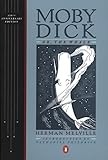 McGrath enlists two young assistants for his investigation — Hopper Cole, a scruffy drug dealer and one-time boyfriend of Ashley’s, and Nora Halliday, a coat check girl/actress who was one of the last people to see Ashley alive. So, on the face of it, we have a good old-fashioned journalistic investigation. That’s like saying Moby-Dick was a fish story.
McGrath enlists two young assistants for his investigation — Hopper Cole, a scruffy drug dealer and one-time boyfriend of Ashley’s, and Nora Halliday, a coat check girl/actress who was one of the last people to see Ashley alive. So, on the face of it, we have a good old-fashioned journalistic investigation. That’s like saying Moby-Dick was a fish story.
What sets Night Film apart is that the telling of the story — the quest for an elusive truth — becomes the story. It’s a deft act of authorial legerdemain that could have backfired, but in Pessl’s hands the story whips along even as it becomes increasingly unclear what the story is, or where it’s heading. As the investigation unfolds, we meet a string of Cordova’s assistants, neighbors, actors, and ex-wives, as well as security guards, tattoo artists, hotel maids, and clerks, shopkeepers, landladies, anyone who had contact with the family. There are intimations of black magic, secret rituals, child sacrifice. The more McGrath and his cohorts learn about Ashley’s life, the less certain they are about the circumstances of her death. It doesn’t help that her invisible father appears to be pulling strings to thwart their investigation.
Pessl embroiders her prose with a grab bag of visual effects that attempt to give the novel documentary heft, including police reports, typed transcripts of telephone calls, photographs, newspaper clippings, text messages, e-mails, online news articles, psychiatric evaluations, and postings from a highly secretive fan website known as The Blackboards. For me, these visuals feel gimmicky and rote, more meta-smoke than actual fire.
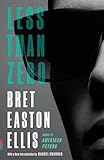

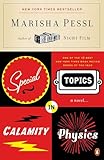 But Pessl’s writing has done a lot of growing up in the seven years since Calamity Physics was published. That novel, the story of a precocious teenage girl and her peripatetic professor dad, had a hyperventilated prose style that struck me as too cute by at least half. At 600 pages, it was also way too long. The book’s privileged teenagers, known as the Bluebloods, exuded none of the anomie of the young things in Bret Easton Ellis’s Less Than Zero, none of the darkness of Donna Tartt’s undergrads in The Secret History. Now Pessl’s cleverness and bloat have given way to assurance. Her writing is frequently deft and insightful. Here’s a bombastic Cordova scholar: “There were two things Beckman truly loathed in life: sitting in the first three rows of a movie theater and the Catholic Church.” And here’s a mousy piano salesman: “You could spot these Mahler-loving men within a ten-block radius of Carnegie Hall. They tended to wear earth tones, have on DVD all of public television’s Great Performances series, live alone in apartments on the Upper West Side, and have potted plants they spoke to daily.”
But Pessl’s writing has done a lot of growing up in the seven years since Calamity Physics was published. That novel, the story of a precocious teenage girl and her peripatetic professor dad, had a hyperventilated prose style that struck me as too cute by at least half. At 600 pages, it was also way too long. The book’s privileged teenagers, known as the Bluebloods, exuded none of the anomie of the young things in Bret Easton Ellis’s Less Than Zero, none of the darkness of Donna Tartt’s undergrads in The Secret History. Now Pessl’s cleverness and bloat have given way to assurance. Her writing is frequently deft and insightful. Here’s a bombastic Cordova scholar: “There were two things Beckman truly loathed in life: sitting in the first three rows of a movie theater and the Catholic Church.” And here’s a mousy piano salesman: “You could spot these Mahler-loving men within a ten-block radius of Carnegie Hall. They tended to wear earth tones, have on DVD all of public television’s Great Performances series, live alone in apartments on the Upper West Side, and have potted plants they spoke to daily.”
Marlowe Hughes, a faded actress, delivers a delicious evisceration of McGrath and his two assistants when they show up to interview her, beginning with Hopper:
“This must be Tarzan, Greystoke, Lord of the Apes. You’re missing a grunt and a club. Can’t wait to see you in your loincloth. Now, who else do we have here?” Enunciating this acidly, she leaned forward to survey Nora. “A chorus girl. You won’t be able to fuck your way to the middle, Debbie. And you.” She turned to me. “A wannabe Warren, straight from Reds. Every one of you, the farting demeanor of the artfully clueless. You people demand to know about Cordova?” She scoffed dramatically, though it sounded like a handful of pebbles rasping in her throat. “And so fleas look up at the sky and wonder why stars.”
As good as such passages are, the writing is not flawless. Pessl has a lazy way with adverbs. People sweat “profusely,” winds howl “punitively,” matches blow out “abruptly,” hair is cropped “hastily.” After a while I found myself wishing Pessl had read Stephen King’s 20 Rules for Writing, including Rule #3: Avoid adverbs. Her heavy use of italics is also unsettling, especially in the trite koans sprinkled throughout the text: Within every elaborate lie, a kernel of truth…Astonishing how quickly money jogged a man’s memory… Everyone smiles for a photograph… Even worse are passages like this dubious bit of social analysis:
In the age of the Internet, pianos, like physical books, were fast becoming culturally extinct. They’d probably stay that way unless Apple invented the iPiano, which fit inside your pocket and could be mastered via text message. With the iPiano you can be an iMozart. Then, you could compose your own iRequiem for your own iFuneral attended by millions of your iFriends who iLoved you.
At first I took such italics as a form of shorthand, a clumsy way of telegraphing meaning. But by the end of the book I had come to see the italics as an effective way of revealing McGrath as a relentless pile-driver, pounding away at his quest for the truth. The italics contribute to McGrath’s portrayal as a driven and annoying character. Which is to say he’s just like most journalists.
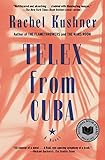 To return to the comparison with Rachel Kushner, I would argue that Kushner’s debut novel, Telex from Cuba, was an even tougher act to follow than Pessl’s Special Topics in Calamity Physics. Telex was a first novel that didn’t behave like one. It had nothing to do with its young creator’s erudition or deft wordplay; it had everything to do with history, politics, and social hierarchies in the lost world of an American enclave in pre-Castro Cuba. There was nothing solipsistic about it. Unlike Special Topics, it felt like the work of a fully formed talent.
To return to the comparison with Rachel Kushner, I would argue that Kushner’s debut novel, Telex from Cuba, was an even tougher act to follow than Pessl’s Special Topics in Calamity Physics. Telex was a first novel that didn’t behave like one. It had nothing to do with its young creator’s erudition or deft wordplay; it had everything to do with history, politics, and social hierarchies in the lost world of an American enclave in pre-Castro Cuba. There was nothing solipsistic about it. Unlike Special Topics, it felt like the work of a fully formed talent.
But that’s not to diminish Pessl’s achievement in Night Film. For me, the book’s finest passage is when the trio penetrates Cordova’s remote estate, The Peak, and then get separated. Chased by dogs and guards, McGrath eludes them by submerging himself in a muck-filled swimming pool, hiding in a greenhouse full of hallucinogenic plants, and wandering through Cordova’s elaborate soundstage. The episode plays out like an extended drug trip — McGrath believes he has become part of a Cordova film — and it leaves him shaken and baffled.
That, to Pessl’s credit, is how McGrath — and the reader — wind up at the end of the book. The mystery is not tied up with a tidy bow, the big questions remain unanswered. But when McGrath finally comes face-to-face with his prey, he has the good sense to be willing to shut up, for once, and listen to Cordova’s version of the truth. It’s the smartest move he makes.



